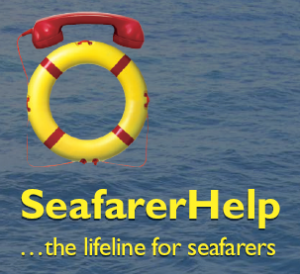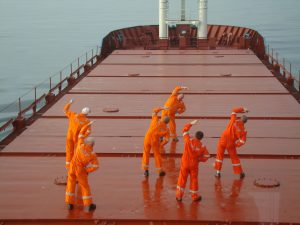 Swelling overcapacity in merchant fleet, uncomfortable merges and allies between ship owners, hardly breathing offshore sector, -recent years have been rather challenging for the shipping industry. And as the ordinary people usually are most affected by all industry misfortunes, seafarers found themselves in the epicenter of the recent crisis.
Swelling overcapacity in merchant fleet, uncomfortable merges and allies between ship owners, hardly breathing offshore sector, -recent years have been rather challenging for the shipping industry. And as the ordinary people usually are most affected by all industry misfortunes, seafarers found themselves in the epicenter of the recent crisis.
SeafarersHelp team of specialists, the frontline of International Seafarers’ Welfare and Assistance Network (ISWAN), has compiled the hit list of problems with which seafarers of 99 different nationalities from 122 countries contacted them throughout a year.
Fear of Unemployment – Key Concern of Maritime Professionals
The majority of enquiries (18.07%) or 736 in actual figures contained a plea for employment assistance or concern about possible loss of position in the near future. Well, today the experts agree that overcapacity harms shipping industry more seriously than brewing trade wars. Moreover, in the offshore market the latest Oil&Gas UK Workforce Report showed the dramatic decline in the number of employed i.e. 302 200 offshore specialists in 2017 compared to almost 464 000 working the North Sea in 2014.
So, the enquiries with which the ISWAN hotline was inundated were completely justifiable, but what to do to avoid being laid off? SeafarersHelp specialists’ piece of advice is to turn to government approved recruitment agencies; however, this certainly doesn’t always pay off.
The first universal rule if seafarer is satisfied with the employment conditions is to stay competent and loyal and ask the manager about available options to remain with the company. Retraining, acquiring additional skills or temporary change of position or vessel might help to stay onboard.
If, nevertheless, seafarer finds himself laid off, the first thing to do is to look closely at his/her CV and make it as neat and eligible as possible. There is a common mistake that crewing managers check only experience and documents set and don’t pay close attention at mistakes and overall negligence in the document. However, general literacy might be crucial especially for officers’ positions.
Then, with the immaculate CV marine specialists are free to approach ship owners, crewing agencies or look for a suitable job at sea on the reputable maritime portals. Another good option is to take some training and acquire side-qualification that will speed off job seeking process. For instance, Matt Abraham, HSE director of Oil&Gas UK in his interview for Rigzone gave quite a bright prognosis for offshore sector employment situation starting from 2018. However, remarked that he meant only ‘techs with different skillsets from what we’ve had in the past’…
Unpaid Wages – 2nd Place in the Chart of Seafarers Woes
When the SeafarersHelp started its work in 2011 this was the main problem (22% of enquiries). The last organization’s report showed that only 16.13% of officers and ratings who turned for help were struggling to collect their well-earned salary. The ISWAN certainly tries to act as mediator in each of these cases. It turns to ITF inspectors and other Employment Organizations, advises to approach lawyers. However, there might be little what these bodies can do legally if the seafarer is not a member of ITF officially. Thus, ITF support team will look through the contract and provide some advise, but only if the seafarer if a member of ITF, will the ITF inspector go onboard to investigate or and pursue marine professional’s interests further with his/her employer company.
Social Isolation, Ship Abandonment and Piracy – Other Acute Topics for Mariners
The SeafarersHelp Annual Review includes 23 positions, some of which experienced a concerning spike in recent years reflecting a charged atmosphere in the shipping industry. One of the most considerable growths showed a Vessel Abandonment. The situation is certainly extremely distressing since seafarers usually have no control over it and have to rely on extraneous help to arrange food and water supplies onboard while waiting for their repatriation.
Incidentally, the problem of Repatriation itself still stands high in the rating occupying the 5th position with the 9.99 per cents of all enquiries. However, it tends to run its course together with issues of Abuse and bullying (7th place) and Ship living conditions (10th place). Experts’ view is that this is a positive influence of MLC 2006 and its provisions for seafarers’ welfare. It also should be admitted that the last point, concerning living conditions onboard is reduced additionally because the large number of old ships have been scrapped away due to the low economic situation.
The problem of Psychological or Mental Health
 The problem of Psychological or Mental Health of marine professionals has become serious worry for many industry specialists over the recent years. The International Seafarers’ Welfare and Assistance Network in alliance with P&I Club produced a self-help manual to assist marine personnel suffering from psychological issues onboard. Otherwise, seafarer in need can always turn to one of the maritime charity organizations’ hotline/live charts. These are usually multilingual, confidential and available 24 hours a day, 365 days per year.
The problem of Psychological or Mental Health of marine professionals has become serious worry for many industry specialists over the recent years. The International Seafarers’ Welfare and Assistance Network in alliance with P&I Club produced a self-help manual to assist marine personnel suffering from psychological issues onboard. Otherwise, seafarer in need can always turn to one of the maritime charity organizations’ hotline/live charts. These are usually multilingual, confidential and available 24 hours a day, 365 days per year.
However, as it was wisely admitted by one of the most distinguished maritime journalists Michel Grey in his piece for Lloyd’s List, all these undertakings would be fruitless unless ship owners changed their attitude to the provision for the needs of their crews.
Meanwhile, such thing as high speed Internet onboard providing an opportunity to talk to one’s family on video chart can make all the difference for the seafarer one day. Same as a chance to leave a vessel for a couple of hours, to change a scene for a while, talk to different people.
On closely related subject, the number of reported Pirates attacks has also increased. At the same time, recent researches show that survivors of pirates’ assaults and especially former hostages experience challenges in recovery. Some might even change their jobs as a result of the incident. Maritime Piracy Humanitarian Response Programme (MPHRP) and a number of other seafarers’ organizations offer their assistance in overcoming the consequences of such attacks; provide re-training and even financial support for the families of those held in captivity.
Shipping industry is a part of global economy, so all major trends can be experienced there. Thus, big general crisis or uptake in some sector will influence maritime job market dramatically. But there are also things that could be improved within the industry itself (conditions onboard, eradication of piracy, fair contracts) that can turn marine professionals’ life for the better too. Recent changes such as adoption of MLC 2006 and amendments to ITF agreements, STCW convention and a number of sector specific guidelines have already brought positive results. There are many reputable organizations such as ISWAN, Apostleship of the Sea, Mission to Seafarers, Sailors Society, CHIRP (Confidential Hazardous Incident Reporting Programme), etc. which promote seafarers’ rights and welfare; can provide information and financial help or repatriation assistance. Seafarers should know that they are protected and that help can always come even to the most remote points of the world.
ISWAN – International Seafarers’ Welfare and Assistance Network

